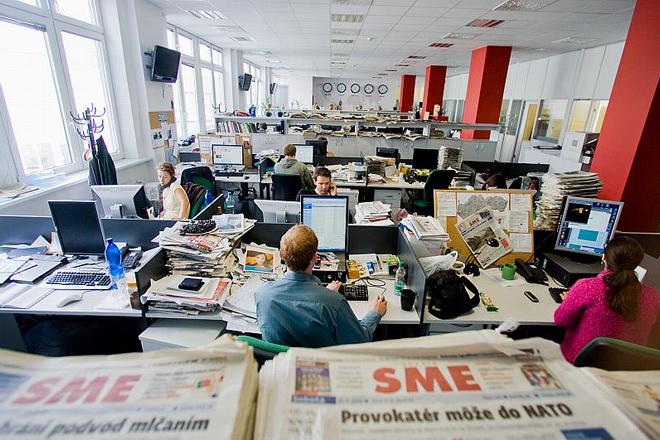SLOVAK journalists recently got an updated set of ethical rules to follow in their daily work. The Slovak Syndicate of Journalists (SSN) passed a new version of its Code of Ethics in early November, the first update in 20 years. Prominent current issues, such as plagiarism and online journalism, are now reflected in the code.
The Code of Ethics will become effective as of January 2011 and most media organisations in Slovakia, even those who are not members of the SSN, are expected to observe it. Journalists who are not SSN members also took part in writing the code, among them Lukáš Fila of the Sme daily, who also contributes to The Slovak Spectator.
The main changes in comparison with the previous code include: the removal of the duty to allow sources to authorise interviews after they have been conducted; clearer rules and definition of what constitutes a conflict of interest for a journalist; a definition of censorship; and a definition of the public interest justification which would entitle a journalists to use a hidden camera and covert sources or to publish information concerning the private life of an individual.
“I would like [the code] to remain not only on paper, but rather I’d like to see publishers in Slovakia acceding to it,” said Peter Kubínyi, the newly-elected SSN chairman, in an interview with the Sme daily, adding that he hopes the code will become a platform for publishers, broadcasters and internet news services.
Media analyst Gabriel Šípoš told Sme that he considers the document to be a good one.
“It covers areas where we repeatedly saw ethical missteps happening,” Šípoš said, mentioning in particular conflicts of interest and decision about whether to use hidden cameras.
Pavol Múdry, the vice-chairman of the International Press Institute (IPI) Slovakia, described the code as an acceptable compromise.
“Since IPI members participated significantly in [writing] the final text, and they were active journalists, we accept it,” Múdry told The Slovak Spectator, adding that there is no doubt that the code needed changing, and the present text is as close to daily journalistic practice as it can be.
The future of the SSN
The SSN not only passed the new Code of Ethics at its congress on November 5, 2010, but also elected a new chairman. Zuzana Krútka was replaced in the post by Peter Kubínyi, who previously worked for the Práca daily and then for the Plus 7 Dní and Žurnál weeklies. Kubínyi is now expected to transform the syndicate, which has been criticised by Slovak journalists as useless and rigid, into an organisation that can serve as a platform for journalists in Slovakia.
IPI’s Múdry, who represents another organisation of journalists, said he believes that the SSN is not up-to-date and has not kept pace with the development of the media or the media environment, and that there is a need for a decision on how the organisation should develop in the future.
“That is, either in the social sphere – and thus as ‘trade-unionist’ protection of journalists, which would mean it would have to deal with journalists’ working conditions and, for instance, their education – or rather as a professional organisation that should influence the media sphere and the relations of the media with the state and the public, the quality of media work, and so on,” Múdry said.
Kubínyi said in an interview with the Sme daily that he intends to change the syndicate into an elite professional organisation which on the one hand will protect the rights of journalists and on the other hand will carry weight in society.
“When the SSN takes a stand on something, it must be heard and people must respect it,” Kubínyi said.


